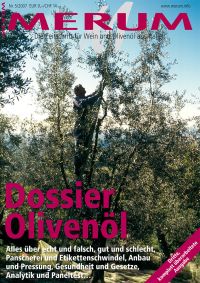 Cheating, fraudulent labelling, fraud and powerless inspectors. In short: olive oil. It is a business worth around ten billion euros, where rough customs prevail and laws count for little. Morals even less. Criminal dealings by the big players in the market are the rule rather than the exception. This is shown by the recently published dossier of Merum, the magazine for Italian wine and olive oil. This now third special issue on the topic is full of competent, comprehensively researched information and facts. However, they quickly spoil the appetite of unsuspecting consumers.
Cheating, fraudulent labelling, fraud and powerless inspectors. In short: olive oil. It is a business worth around ten billion euros, where rough customs prevail and laws count for little. Morals even less. Criminal dealings by the big players in the market are the rule rather than the exception. This is shown by the recently published dossier of Merum, the magazine for Italian wine and olive oil. This now third special issue on the topic is full of competent, comprehensively researched information and facts. However, they quickly spoil the appetite of unsuspecting consumers.
Already 2004 Merum together with the Tuscan environmental authority Arpat had organized a comprehensive test: 31 "extra Vergine" oils from German supermarkets were examined. The testers were only able to confirm this quality claim once. Otherwise, the bottles mostly contained the lowest quality "lampante" oil, which is produced from waste and fallen, often mouldy olives. Only after a refining process is the broth, otherwise used as lamp oil, suitable for human consumption. In factories specially equipped for this purpose, producers transform it in a fast process into oil that is at least no longer harmful to health, without fragrance or taste. Now, for example, producers add "verdone" - a second pressing of olive pomace made with high pressure and steam, which is supposed to give the oil a semi-characteristic aroma. The result is original Italian extra virgin at a special price - including rich profits for the producer.
Oil from synthetic production processes, mixed with animal raw materials, lampante oil and verdone is also sold today with the extra virgin label, it can be read. The dossier describes in detail these machinations, the inadequate controls, explains the connections and effects of these business practices, which are repeatedly favoured by lax EU rules, Italian politics and regional officials. Including corruption and taking advantage.
However, the booklet does not limit itself to questionable industrial production. It explains in detail the background to pressing and extraction, to quality characteristics, legal regulations, cultivation methods and origin. Even the health aspects are not missing - in short, no questions about oil and olives remain unanswered.
Despite the accumulated expertise, the consumer is still left a little perplexed. This is however no criticism at the authors of the dossier, but consequence of the complex-chaotic market situation , as the editorship writes. One thing is clear: healthy, fragrant extra virgin oil simply cannot be produced for 2.99 euros per bottle. Whoever buys it at this price silently accepts counterfeiting.
Conversely, oils for 14 euros per bottle have also turned out to be purified lamp oil in the test. And now? The booklet wants to motivate the consumers "to a maximum of critical purchase behavior"; Miesmachen brings the thing just as little further as general glossing over. The good news of the dossier: There are wonderful, authentic olive oils. The bad news: they are expensive and hard to find.
The fact that the authors are occasionally a little stiff in their wording is probably the only criticism of this booklet. On the one hand, this may have legal reasons. For another, it is only appropriate to describe the hair-raising contexts soberly and precisely. Loose lifestyle phrases would be out of place in any case. And worth reading is each line also in such a way
The special issue on olive oil costs EUR 9.- / CHF 14.- .
Available at the kiosk or to order at:
Tel. +41 (0) 41 349 17 68, Fax +41 (0) 41 349 17 18, merum@edp.ch